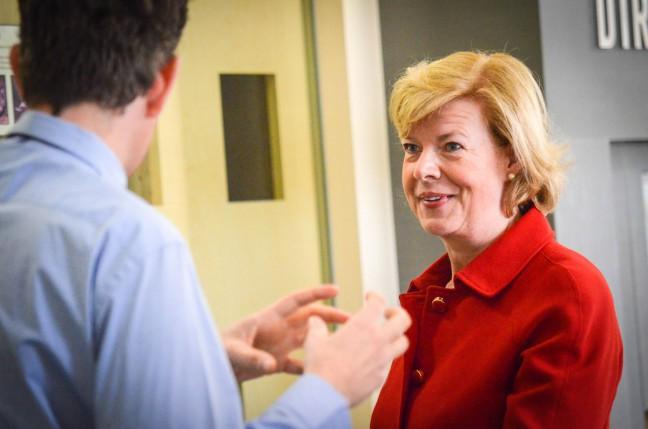A recently-appointed member of a bipartisan budget committee, U.S. Sen. Tammy Baldwin visited the University of Wisconsin campus Tuesday to meet with professors and researchers affected by funding issues created from budget crises.
On her tour of the labs in the Microbial Sciences building, Baldwin met with Cameron Currie, a UW professor with an expertise in microbial diversity, ecology and evolution, and graduate students working in his lab.
As a Ph.D student, Currie said he discovered a special white coating on some ants which could be used as antibiotics.
“If you are only funding applied research, you would have never funded my Ph.D project and we would have continued to look for antibiotics in the same way we originally looked for them,” Currie said.
According to a statement from Baldwin’s office, the shutdown cut the National Institute of Health budget by 5 percent or about $1.55 billion dollars, leading to decreased research funding in the sciences and potentially slowing scientific advancements.
In 2013, the National Institute of Health will issue less than 700 competitive research grants and the cuts will lead to the loss of approximately 25,000 high-paying jobs across the country, according to a statement from Baldwin’s office. The NIH is also a key contributor to the economy, with every dollar of NIH grants stimulating $2 in Wisconsin’s economy, the statement said.
In an email to The Badger Herald, Steven Durlauf, UW economics professor, said the reduction in funding for the NIH would not likely have a short-term effect on campus but is harmful in the long run.
“Cuts in government support of science can collectively cause great damage,” he said. “If the rate of scientific knowledge growth is reduced, so is the rate of growth of the economy in the long run.”
Baldwin, a member of the bipartisan Budget Conference Committee, said the lack of funding and partisan budget talks are frustrating, and she is upset the issues went as far as they did with the government shutdown and debt ceiling talks.
However, Baldwin said she is looking forward to working on the budget conference committee, where she hopes members will “work out paths where we stop governing from crises to crises, stop seeing the impact of these manufactured crises on our population and on our economy and get to a path of regularly and orderly conducting of our budget business at the federal level.”


